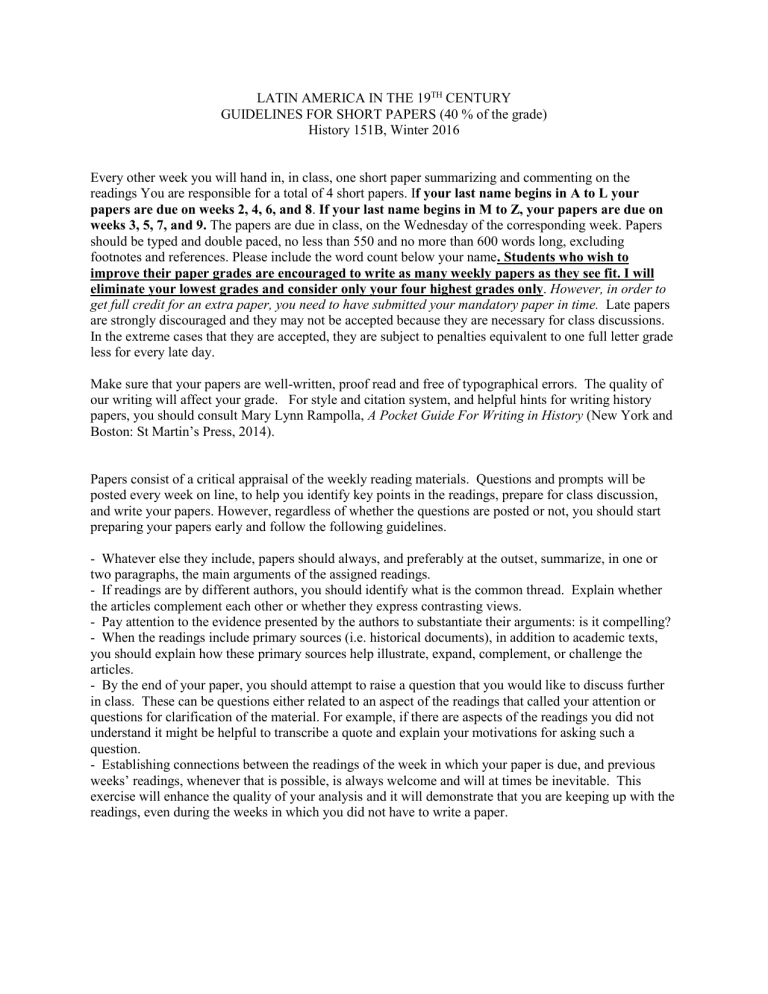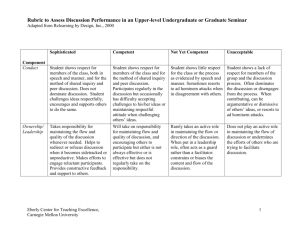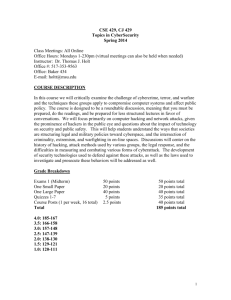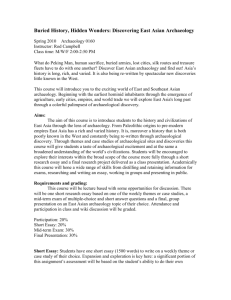HISTORY 151 B, LATIN AMERICA IN THE 19TH CENTURY

LATIN AMERICA IN THE 19 TH CENTURY
GUIDELINES FOR SHORT PAPERS (40 % of the grade)
History 151B, Winter 2016
Every other week you will hand in, in class, one short paper summarizing and commenting on the readings You are responsible for a total of 4 short papers. I f your last name begins in A to L your papers are due on weeks 2, 4, 6, and 8 . If your last name begins in M to Z, your papers are due on weeks 3, 5, 7, and 9. The papers are due in class, on the Wednesday of the corresponding week. Papers should be typed and double paced, no less than 550 and no more than 600 words long, excluding footnotes and references. Please include the word count below your name . Students who wish to improve their paper grades are encouraged to write as many weekly papers as they see fit. I will eliminate your lowest grades and consider only your four highest grades only . However, in order to get full credit for an extra paper, you need to have submitted your mandatory paper in time. Late papers are strongly discouraged and they may not be accepted because they are necessary for class discussions.
In the extreme cases that they are accepted, they are subject to penalties equivalent to one full letter grade less for every late day.
Make sure that your papers are well-written, proof read and free of typographical errors. The quality of our writing will affect your grade. For style and citation system, and helpful hints for writing history papers, you should consult Mary Lynn Rampolla, A Pocket Guide For Writing in History (New York and
Boston: St Martin’s Press, 2014).
Papers consist of a critical appraisal of the weekly reading materials. Questions and prompts will be posted every week on line, to help you identify key points in the readings, prepare for class discussion, and write your papers. However, regardless of whether the questions are posted or not, you should start preparing your papers early and follow the following guidelines.
- Whatever else they include, papers should always, and preferably at the outset, summarize, in one or two paragraphs, the main arguments of the assigned readings.
- If readings are by different authors, you should identify what is the common thread. Explain whether the articles complement each other or whether they express contrasting views.
- Pay attention to the evidence presented by the authors to substantiate their arguments: is it compelling?
- When the readings include primary sources (i.e. historical documents), in addition to academic texts, you should explain how these primary sources help illustrate, expand, complement, or challenge the articles.
- By the end of your paper, you should attempt to raise a question that you would like to discuss further in class. These can be questions either related to an aspect of the readings that called your attention or questions for clarification of the material. For example, if there are aspects of the readings you did not understand it might be helpful to transcribe a quote and explain your motivations for asking such a question.
- Establishing connections between the readings of the week in which your paper is due, and previous weeks’ readings, whenever that is possible, is always welcome and will at times be inevitable. This exercise will enhance the quality of your analysis and it will demonstrate that you are keeping up with the readings, even during the weeks in which you did not have to write a paper.









